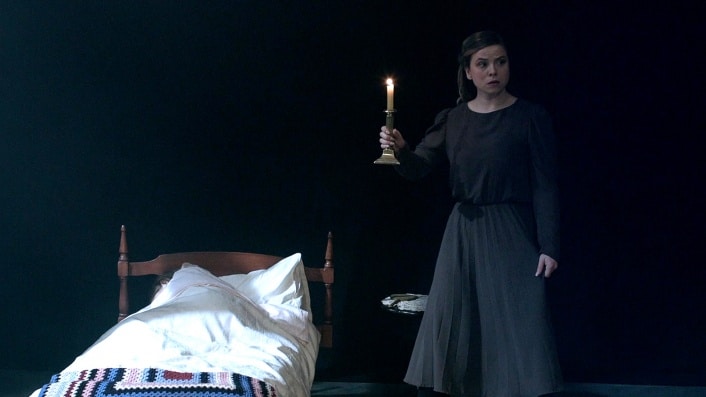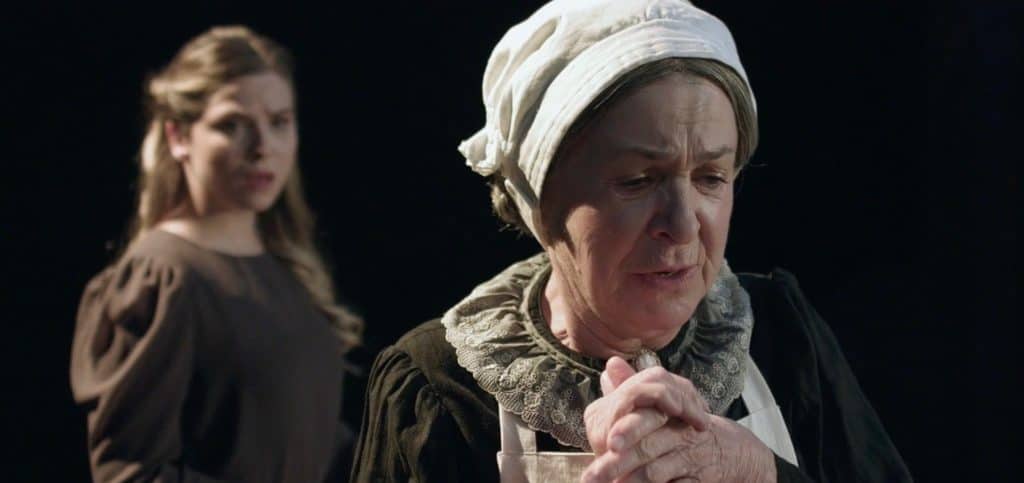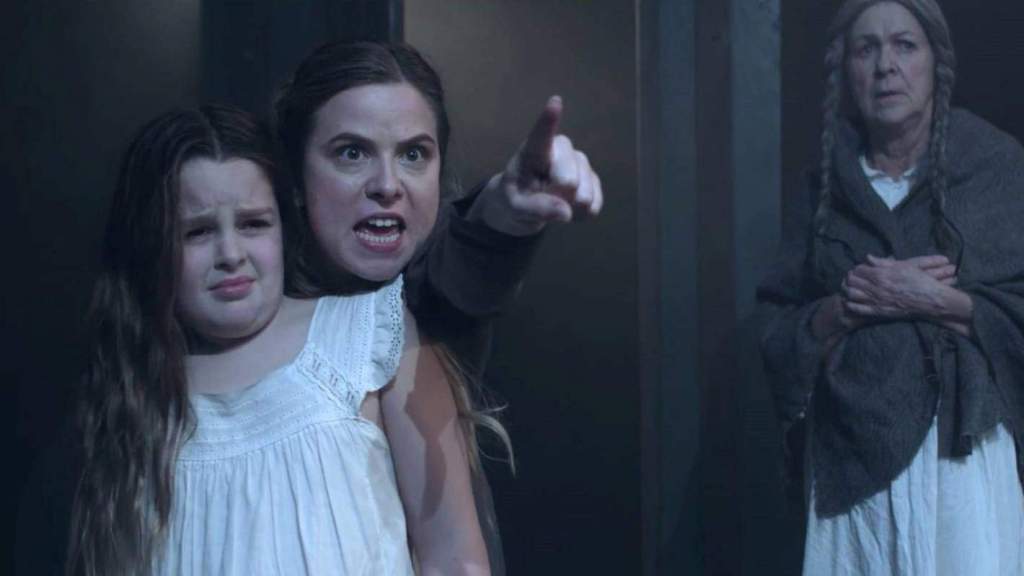Greer Phillips, Ella Olssen, and Jane Waddell in The Turn of the Screw (2021)
★★★★ out of ★★★★★
An insightful take on a classic ghost story. Director Alex Galvin manages to maintain the melancholy tragedy of the Henry James Gothic tale, while adding in an appropriate modern twist that adds an extra layer of meaning to the proceedings.
Directed by Alex Galvin
The Turn of the Screw, written by Henry James in 1898 is one of the most venerated ghost stories of all time. There have been multiple adaptations for this story on film, most notably with faithful interpretation The Innocents (1961) starring Deborah Kerr, and recently with the not-so great modern take The Turning (2020) which ends up dreary and full of unecessary CGI and makes the normally very likeable Finn Wolfhard into a repellant teen version of Miles. Also, Netflix has continued on with their tour of hall of fame ghost stories, following up The Haunting of Hill House with The Haunting of Bly Manor.
Needless to say, we are treading on very familiar ground here. When I sat in for the screening of this opening night feature for the Portland Horror Film Festival, I had a pretty good idea of what to expect. The festival directors suggested to me that this is the best version of the tale that they’ve seen, and I would tend to agree with them. Though recognizable, this version has some nuanced extra layers that made it very enjoyable.
The Turn of the Screw is also quite popular as a stage production, and was turned in to a Broadway production in 1999. And that’s where Alex Galvin’s version of this story finds its twist. The framework here is that it takes place in modern day Wellington, on a stage performance of The Turn of the Screw, for the final dress rehearsal of the play.

Julia (Greer Phillips) has been brought in as a last minute substitute for the actress who was to perform as the governess in the production. The director, Richard (Ralph Johnson) is much relieved and grateful that Julia has arrived at the last moment as the departure of the previous actress had put the whole operation in jeopardy.
Julia, looking for her big break on stage ensures Richard that she has memorized all the lines, and he assures her that she’ll be fine. When she asks about her predecessor, it is revealed that the actress had an emotional breakdown and could no longer perform on stage. But, Richard assures Julia that she’ll be find. Just follow the lighting clues, and the rest of the cast will help her get through the rehearsal, though two of the actors aren’t available, everything should go like clockwork.
The lights dim, the impressive sound effects engage, and the rehearsal begins. For those not familiar with the story, it’s a classic Gothic Victorian tale of a woman who takes a job as the governess for two orphaned children, Flora (Ella Olssen) and Miles (Alex Usher) who have been left in the care of a housekeeper Mrs Grose (Jane Waddell) in a remote country estate, Bly Manor. The man who hired her is their uncle, and he gives her full authority of the raising of the children, and forbids her ever to contact him about their upbringing. It’s your job. Do as you see fit. Don’t contact me. Nice guy, this uncle.
The governess is initially enamored with the children, but she keeps seeing other people mysteriously appearing in the manor. Assured by Mrs. Grose that they are the only ones here, she initially shrugs it off. The children deny seeing these people, but the strange man and woman begin making more frequent appearances, and it seems that the children are interacting with these apparitions.
With the rest of the household in denial or in outright subterfuge, the governess becomes more frantic, as she struggles to get any straight answers from her charges. Everyone in the house is in denial, and these ghosts are manipulating the children. Or… is she just going mad? The drama comes to a tragic end, and Julia finds herself rattled having endured the whole production.

The play itself hews itself very closely to the story, and is a straight up production. What makes this movie tick is the secondary layer of similar plot construction. Julia, like the governess, is a replacement. She believes she is prepared for her gig, but is unprepared when interrupted with a jump scare (Which are quite effective and earned). Julia breaks the fourth wall and shouts into the theater “What the HELL!” and begins to unravel until Richard tells her how great she’s doing.
Julia begins to think that the production is actually haunted, and soldiers on, providing her real emotional state to be reflected in the performance. The conceit isn’t completely convincing though, in that an actual dress rehearsal with a brand new actress would end up getting a ton of direction, and there would be pauses and additional takes. But for the purposes of this movie, it works out rather well.
What the play within a movie allows is a second terrific twist to the conclusion of the film. So, those familiar with the traditional take on this story will be in for a nice surprise. It’s organic, and it feels just right. It’s an appropriately spooky ending to a classic tale, without ruining anything about the effectiveness of the original.
The Henry James novella predated Sigmund Freud and the science of psychology, but it tapped into the classic “I’m not crazy!” line wherein the protagonist suffers a crisis of psychological confidence and everyone else looks at the protagonist as if they are insane. As the science emerged at the turn of the century, scholars looked back with a Freudian overlay, examining hallucination, delusion, and patriarchal themes. This film latches on to the descent into psychological breakdown both within the story and around the stage production. It’s a nice layer cake of ghosty psychological horror. This is how you properly update the Turn of the Screw. Sorry, Turning.
Greer Phillips does a great job at playing an actress within a play in which she is experiencing far more than she expected. Little eye glances and gestures suggest at any moment that she’s going to throw in the towel and say “Enough! I quit!” But the character soldiers on. She also is thoroughly convincing as an actress terrified by her predicament, and channeling it through her performance.
The kid actors Olsssen and Usher do feel like kid actors, which in this context is fine. Though, admittedly the performances seem to be a bit arch and cloying. But that is also the nature of the characters, who are very frustrating for both Julia and the audience. And for all three of these main players, it is their feature film debuts, and as such they did a fine job. Jane Waddell is effective as the glue character within the story, and also as a more seasoned actress to add some gravity to her scenes.
I would watch this back to back with The Innocents to get a full appreciation for the tale. And, I now intend to dive into Bly Manor to compare and contrast my experiences with this tale.
The Turn of the Screw has been making its way through the festival circuit, and is not yet available for streaming. It would probably merit a PG-13 for spooky situations, madness, and jump scares.


